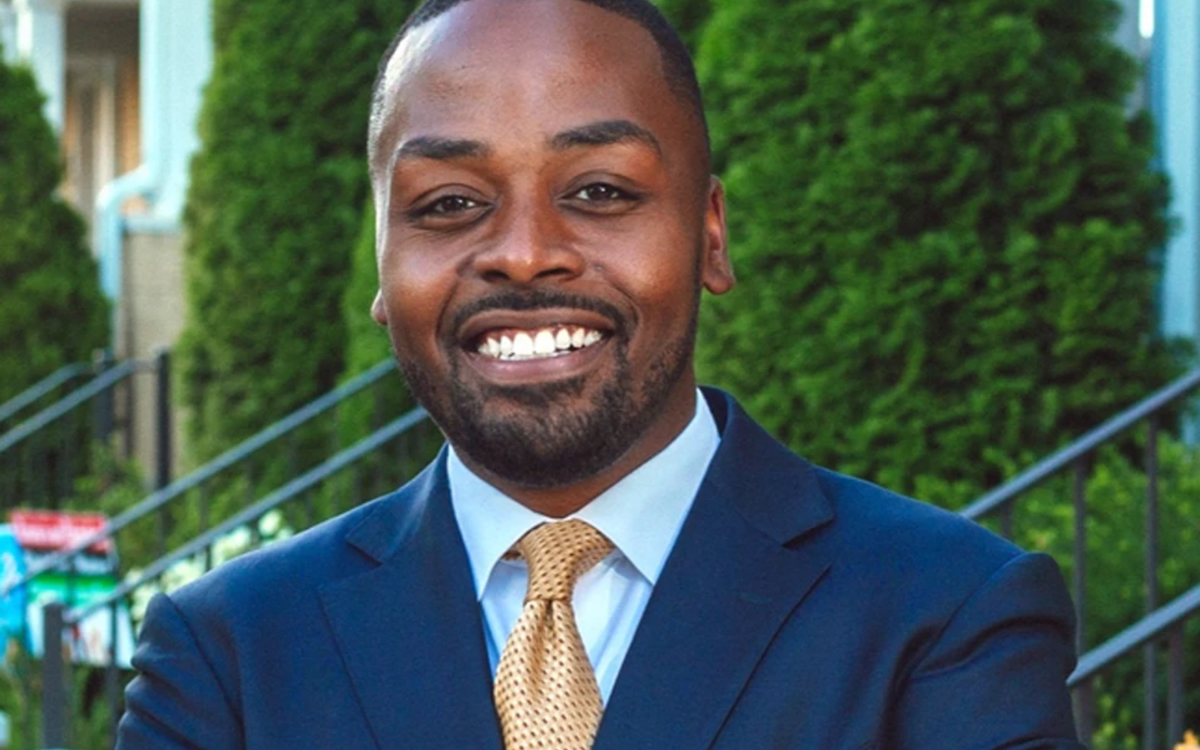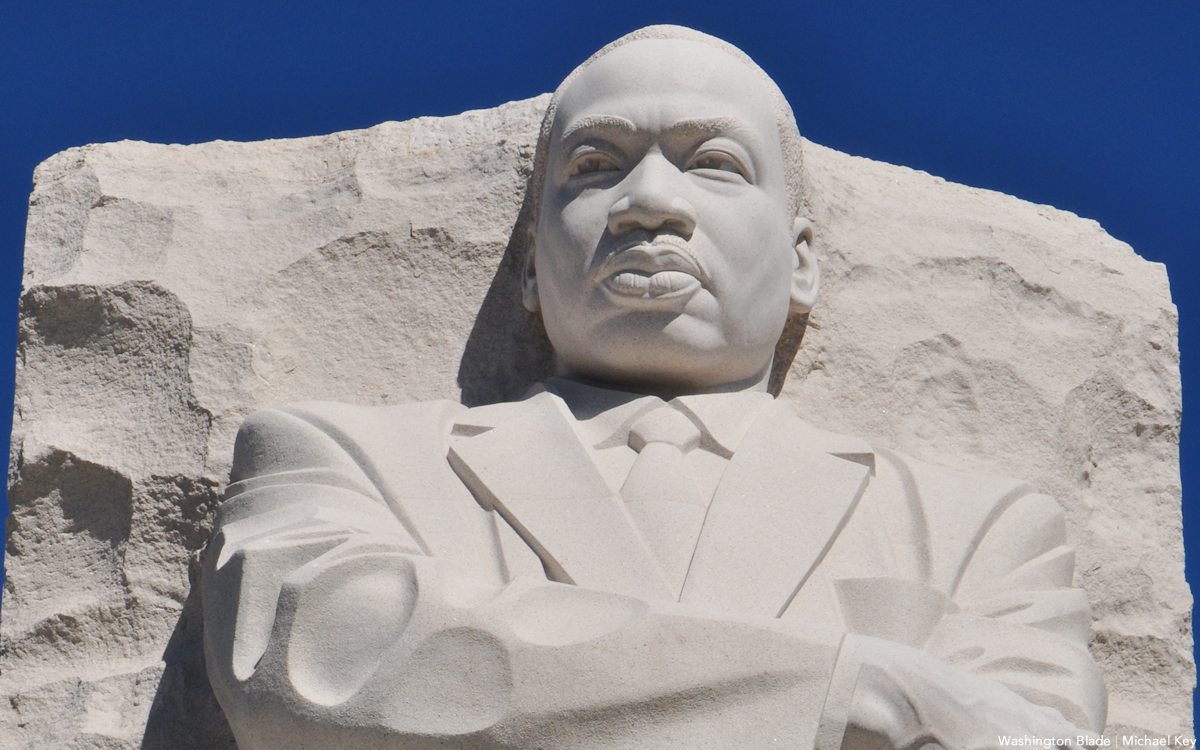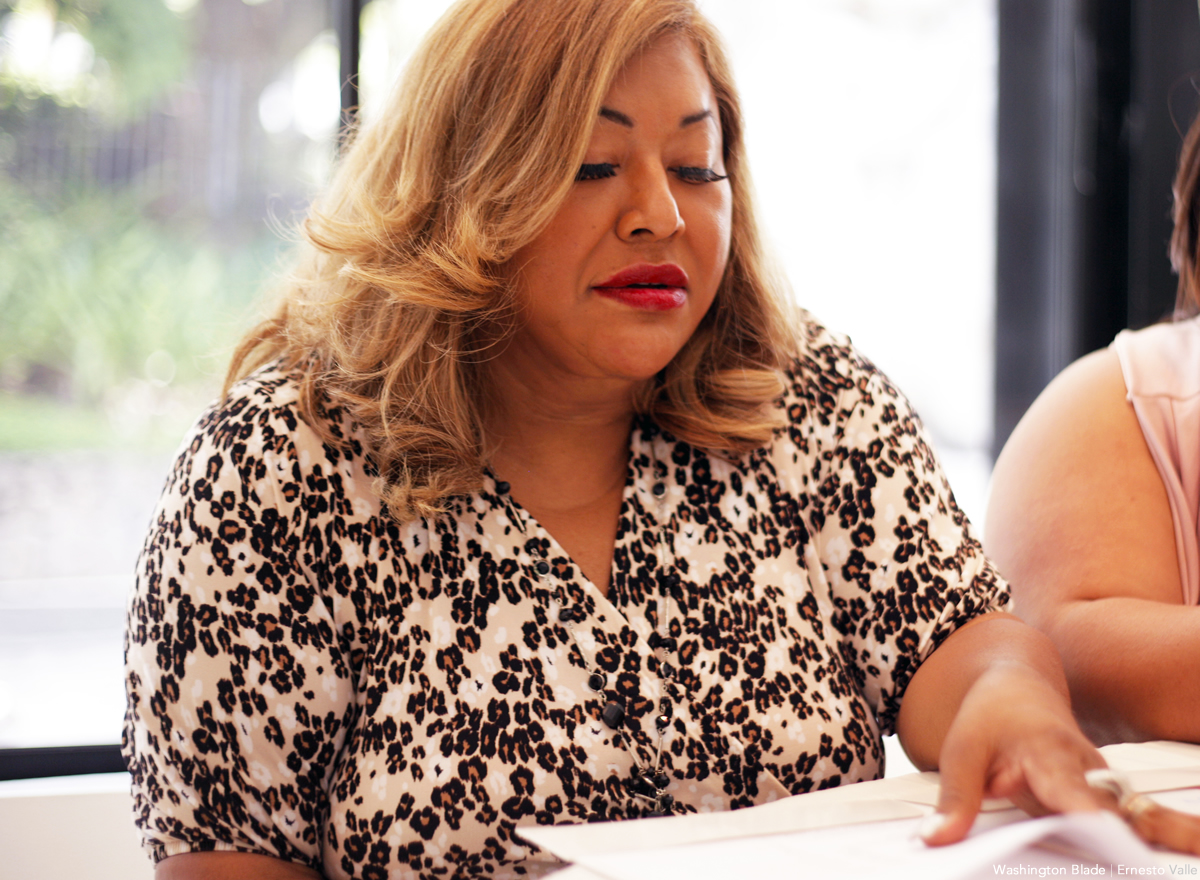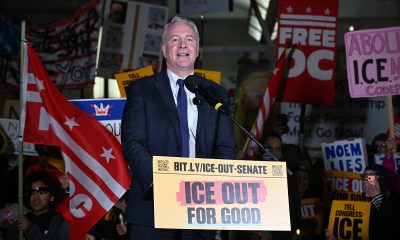District of Columbia
D.C. Council poised for first out gay member since 2015
Parker favored to win in Ward 5; Bowser, Mendelson expected to prevail

In a city whose voters, including LGBTQ voters, are overwhelmingly Democratic, D.C. Democratic elected officials – including Mayor Muriel Bowser and D.C. Council Chair Phil Mendelson – are considered the odds-on favorites to win reelection in the city’s Nov. 8 election.
Among the non-incumbent Democrats expected to win is gay Ward 5 D.C. Council candidate Zachary Parker, who most political observers say will become the first openly gay member of the D.C. Council since 2015, when then gay Council members David Catania (I-At-Large) and Jim Graham (D-Ward 1) left the Council.
Parker is an elected member of the nonpartisan D.C. State Board of Education. He won the Ward 5 Democratic primary on June 21 in a hotly contested, seven-candidate race, beating, among others, former Ward 5 Council member Vincent Orange. He is considered the strong favorite against his lesser-known Republican opponent, Clarence Lee, in the Nov. 8 general election.
Two other out gay candidates are also on the Nov. 8 D.C. election ballot, but they are considered far less likely to win than Parker. Both are running as Libertarian Party candidates. Bruce Majors is running for the D.C. congressional delegate seat held by longtime incumbent and LGBTQ rights supporter Eleanor Holmes Norton (D), who is considered the strong favorite to win reelection. Also running for the congressional delegate seat is Statehood Green Party candidate Natalie Stracuzzi.
The other out gay Libertarian, Adrian Salsgiver, is running for the Ward 3 D.C. Council seat against Democratic nominee Matthew Frumin and Republican David Krucoff. The Ward 3 seat became open when incumbent Democrat Mary Cheh announced she would not run for reelection. Both Frumin and Krucoff have expressed support for LGBTQ rights.
Bowser, who has a long record of support on LGBTQ issues, is similarly considered the strong favorite to finish ahead of her general election challengers, who include Republican Stacia Hall, Independent Rodney Red Grant, and Libertarian Party candidate Dennis Sobin.
Council Chair Mendelson, also a longtime LGBTQ rights supporter, is considered the favorite to win against his challengers – Republican Nate Darenge and Statehood Green Party candidate Darryl Moch.
In a development that surprised some political observers, the Capital Stonewall Democrats, D.C.’s largest local LGBTQ political group, endorsed D.C. Council member Robert White (D-At-Large) against Bowser and Democratic challenger Erin Palmer against Mendelson in the June 21 Democratic primary.
A short time after the primary, when Bowser and Mendelson emerged as the clear winners, Capital Stonewall Democrats endorsed Bowser, Mendelson, and the Democratic nominees in all of the other races.
Among the other races is the contest for two at-large D.C. Council seats, which has emerged as the only race in which the outcome is considered uncertain in the Nov. 8 D.C. general election. And some political observers believe the LGBTQ vote could be the decisive factor in determining the two winners in that race.
Under the city’s Home Rule Charter approved by Congress in the early 1970s, two of the city’s four at-large Council members must belong to a non-majority political party or be an independent.
Longtime LGBTQ rights supporter Anita Bonds holds the Democratic seat up for election this year. The other seat is held by independent incumbent Elisa Silverman, who has also been a strong supporter on LGBTQ issues. Six others are competing for the two seats, with voters having the option of voting for two of the eight contenders.
They include Democrat-turned-independent Kenyan McDuffie, who currently holds the Ward 5 D.C. Council seat; Republican Giuseppe Niosi, who, along with his wife and child, rode in D.C.’s Capital Pride Parade in June; Statehood Green Party candidate David Schwartzman; and independent candidates Graham McLaughlin, Fred Hill, and Karim Marshall. McDuffie has a record of support for LGBTQ rights on the Council and the others have each expressed support for LGBTQ rights.
McLaughlin, a former corporate manager and small business advocate, has said he has worked with LGBTQ organizations, including the Trevor Project, in his role as an advocate for homeless youth.
The Capital Stonewall Democrats has endorsed Bonds for reelection but decided not to make an endorsement for the non-Democrat seat, saying to do so would be backing someone running against Democrat Bonds.
In addition to the Ward 3 and Ward 5 Council races, D.C. Council seats in Wards 1 and 6 are up for election on Nov. 8. In the Ward 1 race, incumbent Democrat Brianne Nadeau, a longtime LGBTQ rights supporter, is considered the strong favorite over Statehood Green Party challenger Chris Otten.
Capital Stonewall Democrats endorsed Nadeau in both the Nov. 8 general election and in the June primary when out gay Democrat and former D.C. police officer Salah Czapary challenged her.
LGBTQ activists who supported Czapary said the LGBTQ voters who backed Nadeau over Czapary based their decision clearly on non-LGBTQ issues – just as most LGBTQ voters are expected to continue to do on Nov. 8 in a city where all candidates with any chance of winning support LGBT rights.
In the case of the Nadeau-Czapary rivalry, Nadeau is considered to be among the progressive-left faction of the Democratic Party, with Czapary falling into the moderate Democratic faction. With the Democratic Party dominating D.C. politics, the liberal left versus moderate factions appears to be the dividing line in D.C. Democratic primaries.
The remaining Council seat up for election this year is in Ward 6, where incumbent Democrat Charles Allen, yet another longtime LGBTQ rights supporter, is running unopposed on Nov. 8.
In the sometimes-overlooked race for the position of U.S. Representative to Congress, which is widely referred to as D.C.’s “shadow” U.S. House seat, incumbent Democrat Oye Owolewa is considered the favorite over Statehood Green Party challenger Joyce Robinson-Paul. Capital Stonewall Democrats has endorsed Owolewa, who has expressed support for LGBTQ rights.
The shadow House position, which has no congressional powers, was created in an amendment to the D.C. home rule charter as a position to lobby Congress for D.C. statehood and D.C. congressional voting rights.
In the race for D.C. Attorney General, Democrat Brian Schwalb, who won the Democratic primary in June, is running unopposed in the Nov. 8 general election. He, too, has expressed support for LGBTQ rights issues.
Longtime D.C. gay Democratic activist Earl Fowlkes, who serves as executive director of the D.C.-based national LGBTQ advocacy group Center for Black Equity, is among those who have said D.C.’s LGBTQ residents sometimes don’t appreciate the supportive political climate of the local D.C. government.
“One of the incredible things that’s happened in D.C. in the last 27 years I’ve been here is the fact that LGBTQ+ issues have been brought to the forefront and there is a universal agreement among almost anyone running for any position or office that they have to be strong in supporting LGBTQ+ issues,” Fowlkes told the Blade.
“This is one of the great places in the world to live in,” he said. “And thanks to our political system and the people who run for office who understand and have their finger on the pulse of the community, LGBTQ people are considered equal citizens in the District,” Fowlkes said. “And there’s a lot of places in this country not far from here who can’t say that.”
In races that traditionally have been nonpartisan, seats on the D.C. State Board of Education are up for election on Nov. 8 for Wards 1, 3, 5, and 6. The Capital Stonewall Democrats has not taken a position on Board of Education candidates.
And the D.C. Gay and Lesbian Activists Alliance (GLAA), which rates candidates for mayor, D.C. Council, and Attorney General, does not issue ratings for school board candidates, nor does it rate candidates for congressional delegate or the shadow House seat.
Founded in 1971, GLAA is a nonpartisan, all volunteer LGBTQ advocacy group that bills itself as the nation’s oldest, continuously operating LGBTQ organization. It has been rating local D.C. candidates since the 1970s on a rating scale of -10 to +10, which is the highest possible rating score showing strong support for LGBTQ equality.
But in the past year it has received criticism from some local LGBTQ activists for basing its ratings on mostly non-LGBTQ specific issues that critics say represent a progressive left viewpoint.
Among the issues the group asks all candidates to take a position on in a required 10-question questionnaire it sends to candidates are decriminalization of sex work, reallocating funds from the police budget for violence prevention programs, support for affordable housing programs for low-income residents, and support for removing criminal penalties for illegal drug possession for personal use.
Other questions in the GLAA questionnaire ask candidates about whether LGBTQ people should have access to a housing voucher program, increasing funding for the Office of Human Rights, which enforces nondiscrimination laws pertaining to LGBTQ people, and whether the city’s tipped minimum wage law should be repealed.
The tipped wage law is the subject of an initiative on the Nov. 8 D.C. election ballot called Initiative 82, which calls for repealing the lower minimum wage for tipped workers and raising it to the full D.C. minimum wage.
GLAA President Tyrone Hanley has said important so-called non-LGBTQ issues such as affordable housing impact LGBTQ people just as they impact all others, and it’s important to ask candidates running for public office to take a stand on those issues.
The group in October released its numerical ratings along with the responses to its questionnaire for 14 candidates that returned the questionnaire, including Mayor Bowser, who the group assigned a +6 rating. For 10 candidates that did not return the questionnaire, GLAA assigned a “0” rating.
Below is a list of the candidates that GLAA has rated along with their ratings. Also below is a link to the group’s explanation for why it issued its specific rating scores and to the questionnaire responses from the 14 candidates that returned the GLAA questionnaire.
D.C. Mayor
Muriel Bowser (D) – +6
Rhonda Hamilton (I) Write-In candidate — +4
Stacia Hall (R) – 0
Dennis Sobin (Libertarian) – 0
Rodney Red Grant (I) — 0
D.C. Council Chair
Phil Mendelson (D) +6
Nate Derenge (R) – 0
Darry Moch (Statehood Green) – 0
D.C. Council At-Large
Elissa Silverman (I) — +7
Kenyan McDuffie (I) — +6.5
Anita Bonds (D) — +6
David Schwartzman (Statehood Green) +6
Graham McLaughlin (I) — +5
Karim Marshall (I) — +4
Giuseppe Niosi (R) – 0
Fred Hill (I) – 0
D.C. Council Ward 1
Brianne Nadeau (D) — +9.5
Chris Otten (Statehood Green) – 0
D.C. Council Ward 5
Zachary Parker (D) +6.5
Clarence Lee (R) – 0
D.C. Council Ward 6
Charles Allen (D) +8.5
D.C. Attorney General
Brian Schwalb (D) +6
Copies of the candidates’ GLAA questionnaire responses and GLAA’s explanation for why it issued specific ratings for the candidates can be accessed here.
District of Columbia
D.C.’s annual MLK Peace Walk and Parade set for Jan. 19
LGBTQ participants expected to join mayor’s contingent

Similar to past years, members of the LGBTQ community were expected to participate in D.C.’s 21st annual Martin Luther King Jr. Day Peace Walk and Parade scheduled to take place Monday, Jan. 19.
Organizers announced this year’s Peace Walk, which takes place ahead of the parade, was scheduled to begin at 10:30 a.m. at the site of a Peace Rally set to begin at 9:30 a.m. at the intersection of Firth Sterling Avenue and Sumner Road, S.E., a short distance from Martin Luther King Jr. Avenue.
The Peace Walk and the parade, which is scheduled to begin at 11 a.m. at the same location, will each travel along Martin Luther King Jr. Avenue a little over a half mile to Marion Barry Avenue near the 11th Street Bridge where they will end.
Japer Bowles, director of D.C. Mayor Muriel Bowser’s Office of LGBTQ Affairs, said he and members of his staff would be marching in the parade as part of the mayor’s parade contingent. In past years, LGBTQ community members have also joined the mayor’s parade contingent.
Stuart Anderson, one of the MLK Day parade organizers, said he was not aware of any specific LGBTQ organizations that had signed up as a parade contingent for this year’s parade. LGBTQ group contingents have joined the parade in past years.
Denise Rolark Barnes, one of the lead D.C. MLK Day event organizers, said LGBTQ participants often join parade contingents associated with other organizations.
Barnes said a Health and Wellness Fair was scheduled to take place on the day of the parade along the parade route in a PNC Bank parking lot at 2031 Martin Luther King Jr. Ave., S.E.
A statement on the D.C. MLK Day website describes the parade’s history and impact on the community.
“Established to honor the life and legacy of Rev. Dr. Martin Luther King, Jr., the parade united residents of Ward 8, the District, and the entire region in the national movement to make Dr. King’s birthday a federal holiday,” the statement says. “Today, the parade not only celebrates its historic roots but also promotes peace and non-violence, spotlights organizations that serve the community, and showcases the talent and pride of school-aged children performing for family, friends, and community members.”
District of Columbia
Ruby Corado sentenced to 33 months in prison
Former Casa Ruby director pleaded guilty to wire fraud in 2024

A federal judge on Jan. 13 sentenced Ruby Corado, the founder and former executive director of the now closed D.C. LGBTQ community services organization Casa Ruby, to 33 months of incarceration for a charge of wire fraud to which she pleaded guilty in July 2024.
U.S. District Court Judge Trevor M. McFadden handed down the sentence that had been requested by prosecutors with the Office of the U.S. Attorney for the District of Columbia after Corado’s sentencing had been postponed six times for various reasons.
The judge also sentenced her to 24 months of supervised release upon her completion of incarceration.
In addition to the sentence of incarceration, McFadden agreed to a request by prosecutors to hold Corado responsible for “restitution” and “forfeiture” in the amount of $956,215 that prosecutors have said she illegally misappropriated from federal loans obtained by Casa Ruby.
The charge to which she pleaded guilty is based on allegations that she diverted at least $180,000 “in taxpayer backed emergency COVID relief funds to private offshore bank accounts,” according to court documents.
Court records show FBI agents arrested Corado on March 5, 2024, at a hotel in Laurel, Md., shortly after she returned to the U.S. from El Salvador, where authorities say she moved in 2022. Prosecutors have said in charging documents that she allegedly fled to El Salvador, where she was born, after “financial irregularities at Casa Ruby became public,” and the LGBTQ organization ceased operating.
Shortly after her arrest, another judge agreed to release Corado into the custody of her niece in Rockville, Md., under a home detention order. But at an Oct. 14, 2025, court hearing at which the sentencing was postponed after Corado’s court appointed attorney withdrew from the case, McFadden ordered Corado to be held in jail until the time of her once again rescheduled sentencing.
Her attorney at the time, Elizabeth Mullin, stated in a court motion that her reason for withdrawing from the case was an “irreconcilable breakdown in the attorney-client relationship.”
Corado’s newly retained attorney, Pleasant Brodnax, filed a 25-page defense Memorandum in Aid of Sentencing on Jan. 6, calling for the judge to sentence Corado only to the time she had already served in detention since October.
Among other things, Brodnax’s defense memorandum disputes the claim by prosecutors that Corado improperly diverted as much as $956,215 from federally backed loans to Casa Ruby, saying the total amount Corado diverted was $200,000. Her memo also states that Corado diverted the funds to a bank account in El Salvador for the purpose of opening a Casa Ruby facility there, not to be used for her personally.
“Ms. Corado has accepted responsibility for transferring a portion of the loan disbursements into another account she operated and ultimately transferring a portion of the loan disbursements to an account in El Salvador,” the memo continues.
“Her purpose in transferring funds to El Salvador was to fund Casa Ruby programs in El Salvador,” it says, adding, “Of course, she acknowledges that the terms of the loan agreement did not permit her to transfer the funds to El Salvador for any purpose.”
In his own 16-page sentencing recommendation memo, Assistant U.S. Attorney John Borchert, the lead prosecutor in the case, said Corado’s action amounted at the least to fraud.
“The defendant and Casa Ruby received no less than $1.2 million in taxpayer backed funds during the COVID-19 global health crisis,” he memo states. “But rather than use those funds to support Casa Ruby’s mission as the defendant promised, the defendant further contributed to its demise by unlawfully transferring no less than $180,000 of these federal emergency relief funds into her own private offshore bank accounts,” it says.
“Then, when media reports suggested the defendant would be prosecuted for squandering Casa Ruby’s government funding, she sold her home and fled the country,” the memo states. “Meanwhile, the people who she had promised to pay with taxpayer-backed funds – her employees, landlord, and vendors – were left behind flat broke.”
A spokesperson for the U.S. Attorney’s office and Corado’s attorney didn’t immediately respond to a request from the Washington Blade for comment on the judge’s sentence.
“Ms. Corado accepts full responsibility for her actions in this case,” defense attorney Brodnax says in her sentencing memo. “She acknowledges the false statements made in the loan applications and that she used some of the money outside the United States,” it says.
“However, the money was still utilized for the same purpose and intention as the funds used in the United States, to assist the LGBTQ community,” it states. “Ms. Corado did not use the money to buy lavish goods or fund a lavish lifestyle.”
Brodnax also states in her memo that as a transgender woman, Corado could face abuse and danger in a correctional facility where she may be sent if sentenced to incarceration.
“Ruby Corado committed a crime, she is now paying the price,” said D.C. LGBTQ rights advocate Peter Rosenstein. “While it is sad in many ways, we must remember she hurt the transgender community with what she did, and in many ways they all paid for her crime.”
District of Columbia
Kennedy Center renaming triggers backlash
Artists who cancel shows threatened; calls for funding boycott grow

Efforts to rename the Kennedy Center to add President Trump’s name to the D.C. arts institution continue to spark backlash.
A new petition from Qommittee , a national network of drag artists and allies led by survivors of hate crimes, calls on Kennedy Center donors to suspend funding to the center until “artistic independence is restored, and to redirect support to banned or censored artists.”
“While Trump won’t back down, the donors who contribute nearly $100 million annually to the Kennedy Center can afford to take a stand,” the petition reads. “Money talks. When donors fund censorship, they don’t just harm one institution – they tell marginalized communities their stories don’t deserve to be told.”
The petition can be found here.
Meanwhile, a decision by several prominent musicians and jazz performers to cancel their shows at the recently renamed Trump-Kennedy Center in D.C. planned for Christmas Eve and New Year’s Eve has drawn the ire of the Center’s president, Richard Grenell.
Grenell, a gay supporter of President Donald Trump who served as U.S. ambassador to Germany during Trump’s first term as president, was named Kennedy Center president last year by its board of directors that had been appointed by Trump.
Last month the board voted to change the official name of the center from the John F. Kennedy Memorial Center For The Performing Arts to the Donald J. Trump And The John F. Kennedy Memorial Center For The Performing Arts. The revised name has been installed on the outside wall of the center’s building but is not official because any name change would require congressional action.
According to a report by the New York Times, Grenell informed jazz musician Chuck Redd, who cancelled a 2025 Christmas Eve concert that he has hosted at the Kennedy Center for nearly 20 years in response to the name change, that Grenell planned to arrange for the center to file a lawsuit against him for the cancellation.
“Your decision to withdraw at the last moment — explicitly in response to the Center’s recent renaming, which honors President Trump’s extraordinary efforts to save this national treasure — is classic intolerance and very costly to a non-profit arts institution,” the Times quoted Grenell as saying in a letter to Redd.
“This is your official notice that we will seek $1 million in damages from you for this political stunt,” the Times quoted Grenell’s letter as saying.
A spokesperson for the Trump-Kennedy Center did not immediately respond to an inquiry from the Washington Blade asking if the center still planned to file that lawsuit and whether it planned to file suits against some of the other musicians who recently cancelled their performances following the name change.
In a follow-up story published on Dec. 29, the New York Times reported that a prominent jazz ensemble and a New York dance company had canceled performances scheduled to take place on New Year’s Eve at the Kennedy Center.
The Times reported the jazz ensemble called The Cookers did not give a reason for the cancellation in a statement it released, but its drummer, Billy Hart, told the Times the center’s name change “evidently” played a role in the decision to cancel the performance.
Grenell released a statement on Dec. 29 calling these and other performers who cancelled their shows “far left political activists” who he said had been booked by the Kennedy Center’s previous leadership.
“Boycotting the arts to show you support the arts is a form of derangement syndrome,” the Times quoted him as saying in his statement.
-

 Iran4 days ago
Iran4 days agoGrenell: ‘Real hope’ for gay rights in Iran as result of nationwide protests
-

 LGBTQ Non-Profit Organizations5 days ago
LGBTQ Non-Profit Organizations5 days agoNational LGBTQ Task Force brings Creating Change conference back to D.C.
-

 Virginia5 days ago
Virginia5 days agoMark Levine loses race to succeed Adam Ebbin in ‘firehouse’ Democratic primary
-

 Congress5 days ago
Congress5 days agoVan Hollen speaks at ‘ICE Out for Good’ protest in D.C.



















